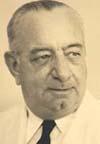Henry Fillmore (3 December 1881 – 7 December 1956) was a United States composer and publisher.
A prolific composer, Fillmore wrote over 250 tunes and arranged orchestrations for hundreds more; he also published a great number of tunes under various pseudonyms. While best known for march music and screamers, he also wrote waltzes, foxtrots, hymns, novelty numbers, overtures and waltzes.
Fillmore was born in Cincinnati, Ohio. In his youth he mastered piano, guitar, violin, and flute -- as well as the slide trombone, which at first he played in secret, as his conservative religious father believed it an uncouth and sinful instrument. He entered the Cincinnati Conservatory of Music in 1901. After this he traveled around the United States as a circus bandmaster with his wife, an exotic dancer named Mabel May Jones. They got married in St Louis.
Music to Fillmore's popular "Trombone Family" seriesIn the 1920s he was back in Cincinnati, directing the Shriners Temple Band, which he turned into one of the most virtuosic marching bands in the country.Fillmore's best known compositions include:The Footlifter
Americans We
Men of Ohio
His Honor
The Klaxon
Miami (March)
Lassus Trombone
(We're) Men of Florida
Military Escort
Mt. Healthy
Noble Men
Rolling Thunder
The Circus Bee
King Karl King
Fillmore gained fame as the Father of the Trombone Smear, writing a series of fifteen novelty tunes featuring trombone smears called "The Trombone Family", including Miss Trombone, Sally Trombone, Lassus Trombone and Shoutin' Liza Trombone. A number of these have a strong ragtime influence.Henry Fillmore wrote under a series of different names such as Harold Bennett, Ray Hall, Harry Hartley, Al Hayes, and the funniest Henrietta Hall. The name that caused a conflict was Will Huff. Because there was a Will Huff, who did compose marches and lived and composed in his state and area.In 1938 he retired to Miami, Florida, but kept active in his later years organizing and rehearsing high school bands in south Florida. Henry Fillmore Band Hall, the rehearsal hall for many of the University of Miami's performing groups, including the Band of the Hour, stands today as a tribute to Fillmore's work in the band genre.
